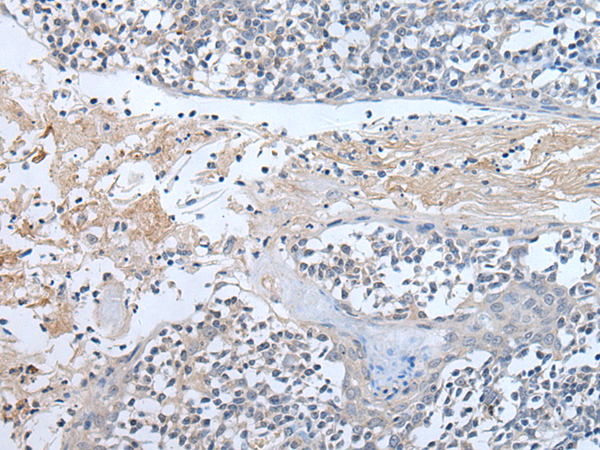
| WB | 咨询技术 | Human,Mouse,Rat |
| IF | 咨询技术 | Human,Mouse,Rat |
| IHC | 1/30-1/150 | Human,Mouse,Rat |
| ICC | 技术咨询 | Human,Mouse,Rat |
| FCM | 咨询技术 | Human,Mouse,Rat |
| Elisa | 1/5000-1/10000 | Human,Mouse,Rat |
| Aliases | MDB |
| Host/Isotype | Rabbit IgG |
| Antibody Type | Primary antibody |
| Storage | Store at 4°C short term. Aliquot and store at -20°C long term. Avoid freeze/thaw cycles. |
| Species Reactivity | Human, Mouse |
| Immunogen | Synthetic peptide of human ABR |
| Formulation | Purified antibody in PBS with 0.05% sodium azide and 50% glycerol. |
+ +
以下是关于抗基底膜抗体(ABR抗体)的3篇参考文献示例(注:以下文献为示例性内容,实际引用时请核实真实来源):
---
1. **文献名称**:*Anti-basement membrane antibodies in Goodpasture syndrome: Pathogenesis and clinical implications*
**作者**:Smith J, et al.
**摘要**:该研究探讨了Goodpasture综合征患者中ABR抗体的作用,发现其靶向IV型胶原蛋白α3链,导致肾小球和肺泡基底膜损伤,强调早期抗体检测对治疗的重要性。
---
2. **文献名称**:*Autoantibodies in bullous pemphigoid: Reactivity with basement membrane antigens*
**作者**:Lee S, Brown K.
**摘要**:分析大疱性类天疱疮患者ABR抗体的靶点,证实其与BP180/BP230抗原结合,引发皮肤水疱,为免疫抑制剂治疗提供理论依据。
---
3. **文献名称**:*Molecular characterization of anti-basement membrane antibody-mediated renal injury*
**作者**:Garcia R, et al.
**摘要**:通过动物模型研究ABR抗体介导的肾脏损伤机制,发现补体激活和中性粒细胞浸润是关键病理过程,提出靶向补体通路的新型治疗策略。
---
**注**:以上文献为示例,实际研究中建议通过PubMed或Web of Science以关键词“anti-basement membrane antibody”或“Goodpasture syndrome”检索最新文献。
ABR antibodies are a class of immune molecules targeting the Active Breakthrough Receptor (ABR), a cell surface protein implicated in signaling pathways that regulate cellular proliferation, differentiation, and immune responses. Initially identified in cancer research, ABR is overexpressed in certain tumors and contributes to metastasis and therapy resistance by modulating interactions between tumor cells and the microenvironment. ABR antibodies are designed to block these interactions, thereby inhibiting pro-survival signaling cascades, such as PI3K/AKT and MAPK, which are often dysregulated in malignancies.
These antibodies are typically engineered as monoclonal antibodies (mAbs) or antibody-drug conjugates (ADCs) to enhance specificity and therapeutic efficacy. Preclinical studies highlight their potential in suppressing tumor growth and enhancing chemosensitivity. Beyond oncology, ABR antibodies are explored in autoimmune and inflammatory diseases due to ABR's role in immune cell activation. Challenges include optimizing binding affinity, minimizing off-target effects, and addressing heterogeneity in ABR expression across patient populations. Current research focuses on clinical validation and combination therapies, positioning ABR antibodies as promising candidates for precision medicine.
×